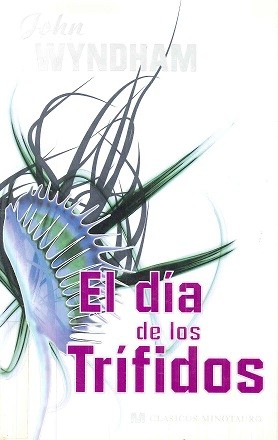Précurseur des zombies
5 stars
Grand classique

278 pages
Spanish language
Published Nov. 3, 2008 by Minotauro.
Unas extrañas luces verdes han aparecido en el cielo y la mayor parte de la humanidad ha alzado la mirada para contemplar el fenómeno. A la mañana siguiente todos despiertan ciegos. Las pocas personas que conservan la vista inician la lucha por sobrevivir en un mundo que se debate entre la desesperación y la barbarie.
Uno de ellos es Bill Masen, que se encuentra ingresado en el hospital, recuperándose del ataque de una planta mutante creada por el hombre: los trífidos. Se trata de enormes vegetales capaces de moverse y que han desarrollado una especie de lengua venenosa con la que agreden a los humanos. Ahora que han descubierto la debilidad de éstos, los trífidos se disponen a heredar la Tierra..., si los supervivientes no lo impiden.
Grand classique
I've been wanting to read Day of the Triffids for years. I should have done so sooner - it was fine, but I think I expected better.
I'm a little conflicted about this book. It's a unique and innovative take on the post-apocalyptic dystopia genre, and given it's age there's no doubting it's influence. It's clear to see shades of 28 days later. It's refreshing to read a zombie story with no zombies, but the titular plants that rule the day feel like an afterthought. At points the characters even seem to forget about them. Maybe it's just hard to envision sentient plants that walk and swing whip-like stingers. The characters seemed to focus too much on rebuilding society, while the brutal aspects of humanity in a survival situation felt like an afterthought. Seems the author thought more about how people would be shagging after the apocalypse than how they would be feeding themselves. Again, the lack of zombies was a pleasant respite, but the blind people who replace them being dismissed as helpless burdens on those …
I'm a little conflicted about this book. It's a unique and innovative take on the post-apocalyptic dystopia genre, and given it's age there's no doubting it's influence. It's clear to see shades of 28 days later. It's refreshing to read a zombie story with no zombies, but the titular plants that rule the day feel like an afterthought. At points the characters even seem to forget about them. Maybe it's just hard to envision sentient plants that walk and swing whip-like stingers. The characters seemed to focus too much on rebuilding society, while the brutal aspects of humanity in a survival situation felt like an afterthought. Seems the author thought more about how people would be shagging after the apocalypse than how they would be feeding themselves. Again, the lack of zombies was a pleasant respite, but the blind people who replace them being dismissed as helpless burdens on those who maintained sight seems ableist and flat. The main characters have a pretty bland romance that takes up a lot more words than it deserves. Side characters are barely developed, but numerous. All it all the narrative flounders. I really want to give this four stars; after all, I finished it which is saying something, but I just can't. It's pulpy, and not really that compelling. Margaret Atwood did it MUCH better with Oryx and Crake.